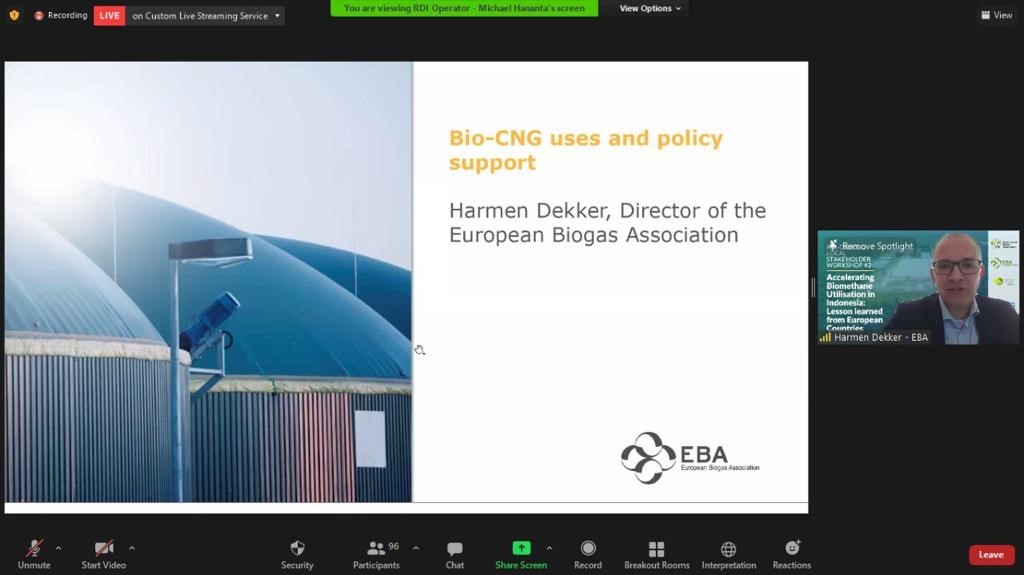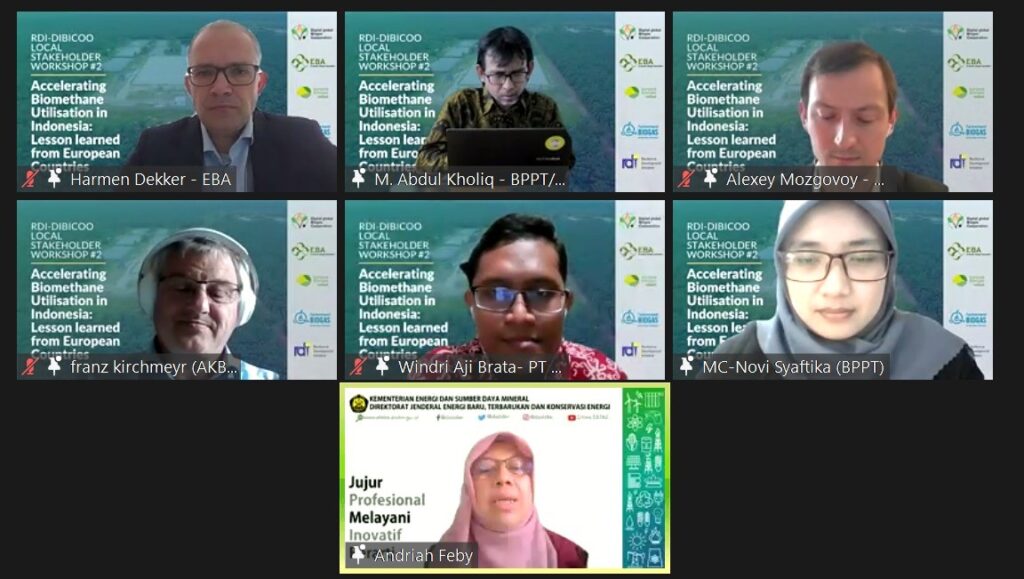To increase trade balance and environmental conservation, Indonesia’s government has declared their renewable energy (RE) commitment. Several efforts to achieve carbon neutrality have been tried such as increasing energy efficiency, EV, coal co-firing, and also deploying biogas. The development of biogas processing and purification technology has opened up new opportunities in maximizing its utilisation. Biomethane with its multi beneficials, is one of the biggest technologies that is within reach and as solution in reducing emission. In acknowledgement of all of the points stipulated above, Resilience Development Initiative (RDI) held The DiBiCoo Local Workshop Series #2 with the topic of “Accelerating Bio-Methane Utilization in Indonesia: Lesson Learned from European Countries”, on May, 7th 2021 via Zoom Platform. By involving biogas industry players in Indonesia, especially in the field of biogas processing, this workshop aimed to discuss how DiBiCoo can contribute to the acceleration of Biomethane utilization in Indonesia.
This event discussed the development of biogas processing and purification technology which has opened up new opportunities in maximizing its utilization through biomethane with its multi-beneficial, is one of the biggest technologies that are within reach and as a solution in reducing emission. This event invited few experts in this field such as Andriah Feby Misna which a Director of Renewable Energy from the Ministry of Energy and Mineral Resources, Harmen Dekker as the Director of the European Biogas Association (EBA), and Alexey Mozgovoy as a Business Development Manager International Biomethane at PlanET Biogastechnik. This event also was supported by few discussants namely Windri Aji Brata as an Energy and Sustainability Specialist at PT SMART Tbk and Discussant: Franz Kirchmeyr from Kompost & Biogas Verband Osterreich (AKBOE). Andriah Feby Misna brought the prospect and challenges of biomethane in Indonesia. From the technical side, bio-methane in Indonesia still has not been commercialized widely. Indonesia needs some assessments and pilot projects to make sure what kind of business is necessary to develop, including the price and the cost. Windri Aji Brata added that Bio-methane from palm-oil is supposed to be competitive with fossil fuels (LPG/diesel fuel), especially in rural/remote areas in terms of accessibility and lower price. So, the challenges lie in the utilization and how to find markets to absorb the produced bio-methane.

Coming from a European perspective in Biomethane utilization, Harmen Dekker has made it clear that biogas is unique as it is at the heart of green development. Biogas tackles a lot of the problems at the same time and not other renewable energy could do that. Don’t focus on the specific technology like bio-LNG, focus on the production of biogas first, and distribution channel is the next issue. It is just a matter of timing. With specific case of Germany, Alexey Mozgovoy concluded that the growth of biomethane plants installment depends very much on the incentives given by the government. Not only highlighting the biomethane production and biomethane plant installment but also how to bring the bio-methane to the consumers. It won’t be an easy task for Indonesia’s government, but he did believe it is achievable with the amount of biowastes available. Linking back to the terms of biomethane as a form of biogas upgrading, Franz Kirchmeyr added that in Europe, the term upgrading is to apply the biomethane and feed it to the gas-grid connection while in other countries it is more about the purification. Upgrading biogas has huge variations in the application techniques and so many countries need to have to be clear & aware about the situation they faced in maximizing their biomethane potential according to what they need.
